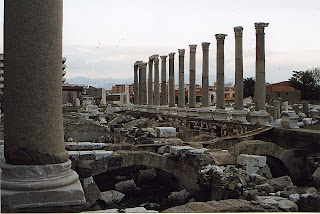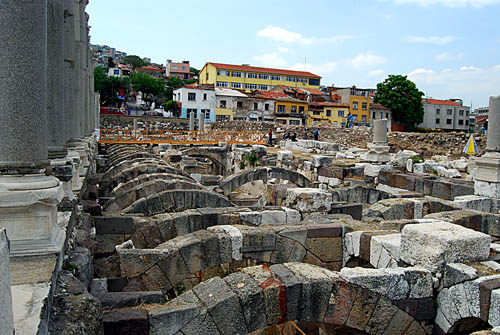History of Izmir
 |
| Izmir |
The 5,000 year-old city of Izmir is one of the oldest cities of the Mediterranean basin. The original city was established in the third millennium BC (at present day Bayraklı), at which time it shared with Troy the most advanced culture in Anatolia.Greek settlement is attested by the presence of pottery dating from about 1000 BC. In the first millennium BC Izmir, then known as Smyrna, ranked as one of the most important cities of the Ionian Federation. During this period, it is believed that the epic poet Homer resided here.
 |
| Izmir |
Lydian conquest of the city around 600 BC brought this golden age to an end. Smyrna was little more than a village throughout the Lydian and subsequent sixth century BC Persian rule. In the fourth century BC a new city was built on the slopes of Mt. Pagos (Kadifekale) during the reign of Alexander the Great. Smyrna's Roman period, beginning in the first century BC, was its second great era.
In the first century AD, Smyrna became one of the earliest centers of Christianity and it was one of the Seven Churches of Revelation. Both Revelation and the Martyrdom of Polycarp indicate the existence of a Jewish community in Smyrna as early as the 1st and 2nd centuries AD. The letter to the church at Smyrna in Revelation indicates that the Christians were spiritually "rich" and apparently in conflict with the Jews: "I know the slander on the part of those who say that they are Jews and are not, but are a synagogue of Satan." (2:9)
 |
| Izmir |
The origins of the Christian community there, which was established in the 1st century, are unknown. Ignatius of Antioch stopped at Smyrna on his way to martyrdom in Rome in 107 AD, and he sent a letter back to the Christians there from later in his journey. Smyrna's bishop, Polycarp, was burned at the stake in Smyrna's stadium around 156 AD.
Byzantine rule came in the fourth century and lasted until the Seljuk conquest in 11th century. In 1415, under Sultan Mehmed Çelebi, Smyrna became part of the Ottoman Empire.
The city earned its fame as one of the most important port cities of the world during the 17th to 19th centuries. The majority of its population were Greek but merchants of various origins (especially Greek, French, Italian, Dutch, Armenian, Sephardi and Jewish) transformed the city into a cosmopolitan portal of trade. During this period, the city was famous for its own brand of music (Smyrneika) as well as its wide range of products it exported to Europe (Smyrna/Sultana raisins, dried figs, carpets, etc.).
Today, Izmir is Turkey's third largest city and is nicknamed "the pearl of Aegean." It is widely regarded as the most Westernized city of Turkey in terms of values, ideology, gender roles, and lifestyle.
 |
| Izmir |
 |
| Izmir |
 |
| Izmir |
 |
| Izmir |






